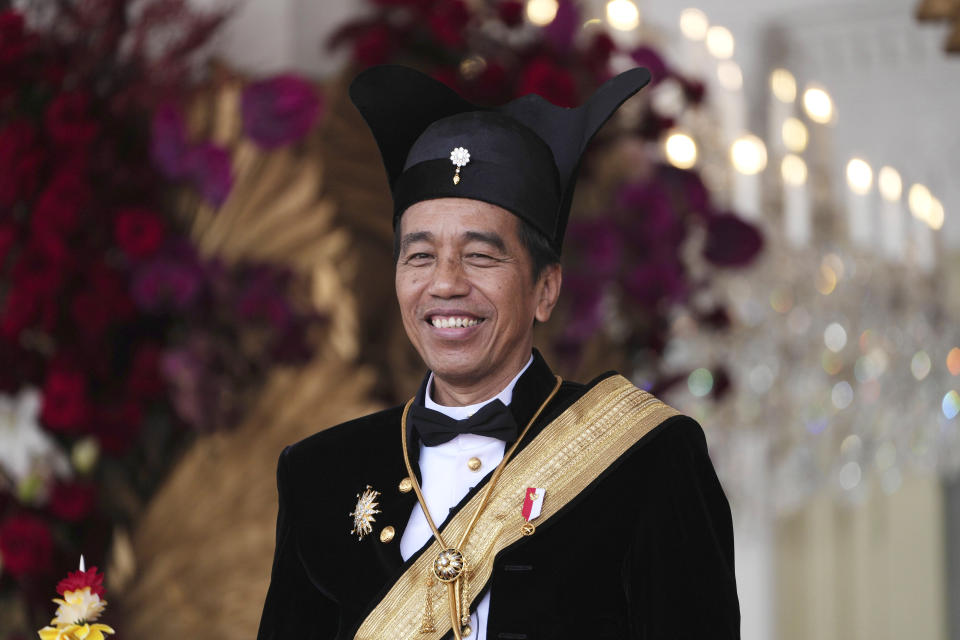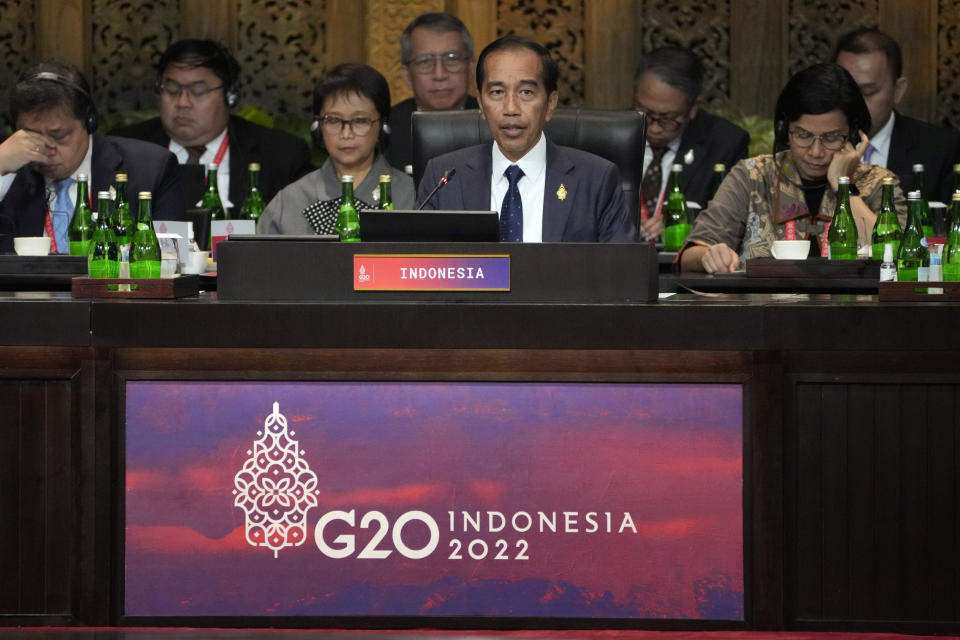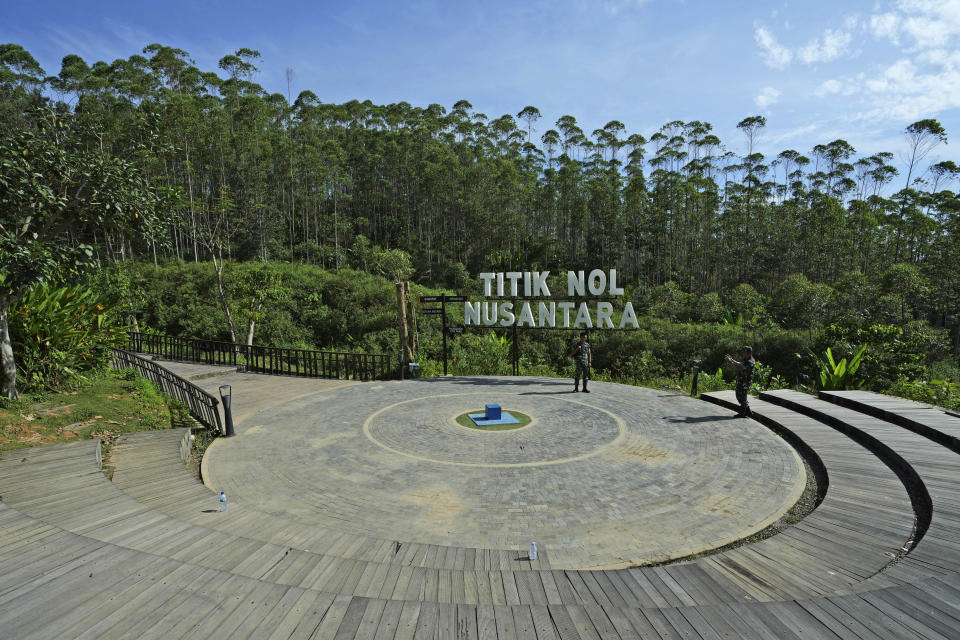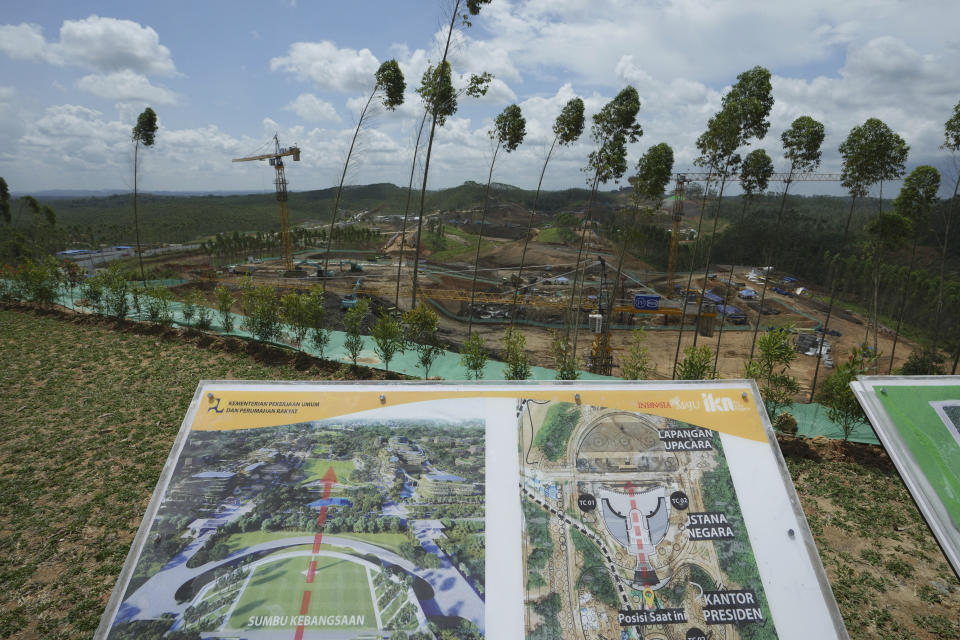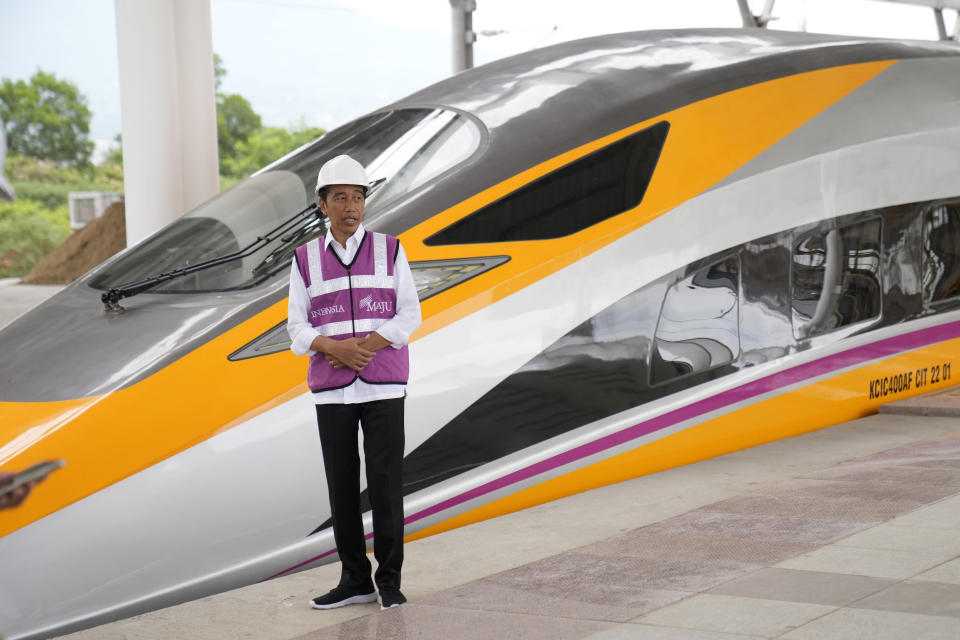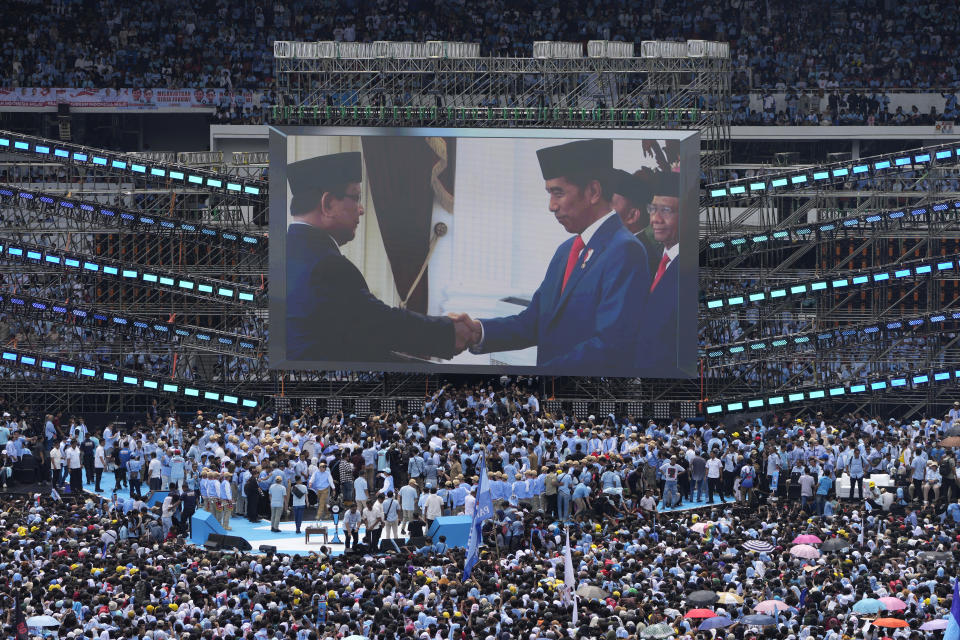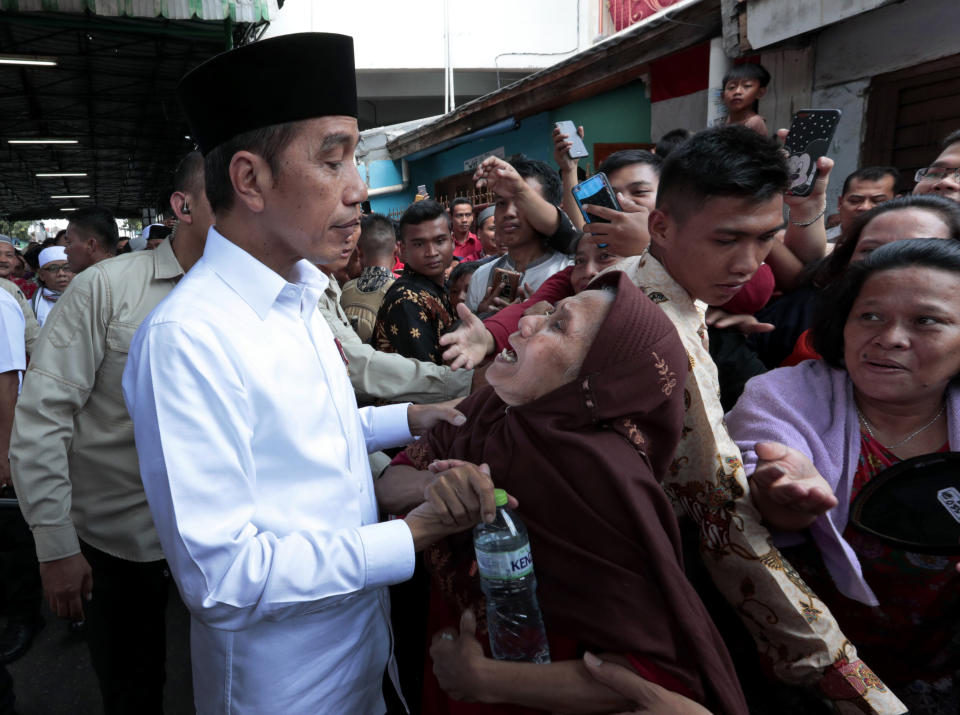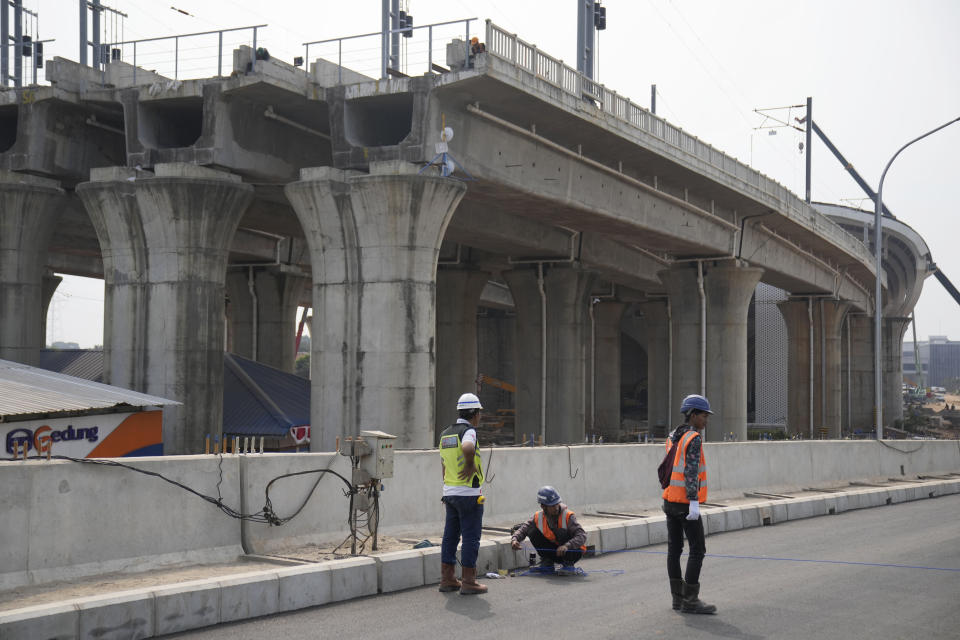Indonesia's president, who mingles with people and listens to Metallica, still popular in last term
- Oops!Something went wrong.Please try again later.
- Oops!Something went wrong.Please try again later.
- Oops!Something went wrong.Please try again later.
JAKARTA, Indonesia (AP) — Joko Widodo’s phenomenal rise from a riverside slum, where he grew up, to the presidency of Indonesia spotlighted how far the world’s third-largest democracy had veered from a brutal authoritarian era decades ago.
With his second and final five-year term ending in October, Widodo — regarded by some as Asia’s Barack Obama — is leaving a legacy of impressive economic growth and an ambitious array of infrastructure projects topped by a $33 billion plan to relocate Indonesia’s congested capital to the frontier island of Borneo.
Dismissed as a political lightweight by rivals when he first won the presidency in 2014, Widodo built a reputation as a soft-spoken reformer who promised to fight poverty and inequalities by exploiting Indonesia’s abundant resources and tourism draw to propel its economy, the largest in Southeast Asia. He served as mayor of Solo city, where he was born to a working-class family in illegally built shacks along a river, then became governor of the capital, Jakarta, before clinching his first presidential term.
Widodo was the first Indonesian president to emerge outside the political and military elite. But critics say he thrived on political compromises, became beholden to political party supporters and accommodated ex-generals who served under the late authoritarian leader Suharto. His pragmatic deals cushioned opposition to his leadership but also threatened Indonesia's fragile democracy that sprang a commoner like him, the son of a wood seller, to power.
Forging political compromises in the world’s largest archipelago nation with deep religious, ethnic and economic divides has been a constant struggle even by past leaders.
Widodo was widely criticized when he appointed Prabowo Subianto — his main challenger in two presidential elections — as defense minister in 2019, after winning his second term.
“I am aware that there are people calling me stupid, dumb, ignorant, a pharaoh, a fool,” Widodo said in his state of the nation address last year. “What breaks my heart is that the polite culture and noble character of this nation seem to have ebbed away. Freedom and democracy are used to vent malice and slander."
A special forces general accused of committing human rights atrocities in the Suharto era, Subianto is now the frontrunner in the Feb. 14 elections. His vice-presidential running mate is Widodo’s eldest son, Gibran Rakabuming Raka, who is the mayor of Surakarta, Widodo’s hometown in Central Java province.
Widodo's son did not meet the age requirement of 40 for his candidacy but the Constitutional Court — headed by the president’s brother-in-law — made an exception in a ruling last year.
A group of critics was considering an impeachment complaint against Widodo but legal experts said the chances of it succeeding are slim. He's still popular and parliament is dominated by his allies.
Also known as Jokowi, Widodo, now 62, nurtured an image of an Indonesian everyman with a soft spot for the underclass and down-to-earth lifestyle that resonated with a wide base of ordinary voters.
He often mingled with working-class crowds in cheap sneakers and rolled-up sleeves to check on their concerns. He took selfies with hordes of journalists and is one of the biggest fans of Metallica, the American heavy metal band whose concerts in the Indonesian capital he watched when he was the Jakarta governor.
Widodo has enjoyed consistently high approval ratings of over 70% in recent months, an impressive feat in the final years of a decadelong presidency. It also makes him a powerful election endorser, a kingmaker, despite legal restrictions against the practice. Opponents have accused him of covertly using his clout to back his son and Subianto to create a new political dynasty.
He has laughed off the accusations and called on Indonesians to help the next leaders press on with reforms to foster economic growth.
Widodo's flagship projects centered on linking the nation of more than 17,000 islands with bridges, a high-speed train, toll roads, ports and airports.
“Jokowi is not a perfect leader, but still he’s the best leader we’ve ever had,” said Dwi Mustikarini, a Jakarta resident, “He made Indonesia better and was respected by world leaders, but unfortunately, his political ambition to create a dynasty was like an obstacle for him to ending his reign with a soft landing.”
Aiming to generate more revenues and job opportunities, Widodo banned the export of selected raw materials like nickel ore and encouraged their local processing to get better prices in foreign markets.
In a bid to lure investors and tourists and spur growth and employment beyond traffic-choked and overcrowded destinations like Jakarta, he launched one of the most ambitious and controversial projects of his presidency: relocating the capital about 2,000 kilometers (1,240 miles) away to Borneo, a vast region of lush tropical rainforests where orangutans roam.
In mid-2022, despite warnings from environmental activists of massive deforestation and protests by Indigenous communities, construction of the new capital began. It is envisioned as a futuristic green city about twice the size of New York. A grand inauguration is planned on Aug. 17 coinciding with Indonesia’s Independence Day, but authorities say the final stages of the city won’t likely be completed until 2045.
Under Widodo, Indonesia saw a period of remarkable growth averaging 5% annually, except in 2020, when the economy contracted due to the coronavirus pandemic.
His economic roadmap, called “Golden Indonesia 2045,” projects Indonesia becoming one of the world’s top five economies with GDP of up to $9 trillion, exactly a century after it won independence from Dutch colonizers.
That could be achieved if future leaders would muster the courage to make “difficult and unpopular decisions” and gain the support of different sectors, Widodo said in his speech last year. He warned that squandering the opportunity could bring Indonesia back to instability.
Largely focused on domestic issues, the Bahasa-speaking Widodo also played a role on the world stage, where he often spoke through an interpreter and at times appeared uncomfortable with formalities and protocol.
In 2022, he became the first Asian leader to visit Ukrainian President Volodymyr Zelenskyy in Kyiv and later Russian leader Vladimir Putin in Moscow to help encourage the two enemies to start a dialogue.
Later that year, he hosted a summit of the G20 leading rich and developing nations. In a delicate balancing act, he met President Joe Biden in the White House for talks on boosting defense cooperation after meeting Chinese President Xi Jinping in China to expand trade and investment.
Asked by journalists what he would do when he steps down, Widodo said he plans to return to his family in his hometown, where his political journey began, and play an active role in protecting the environment.
“That's the plan,” Widodo told Bloomberg Television in a recent interview. “But sometimes, plans can change.”
___
Associated Press writer Jim Gomez contributed to this report.
